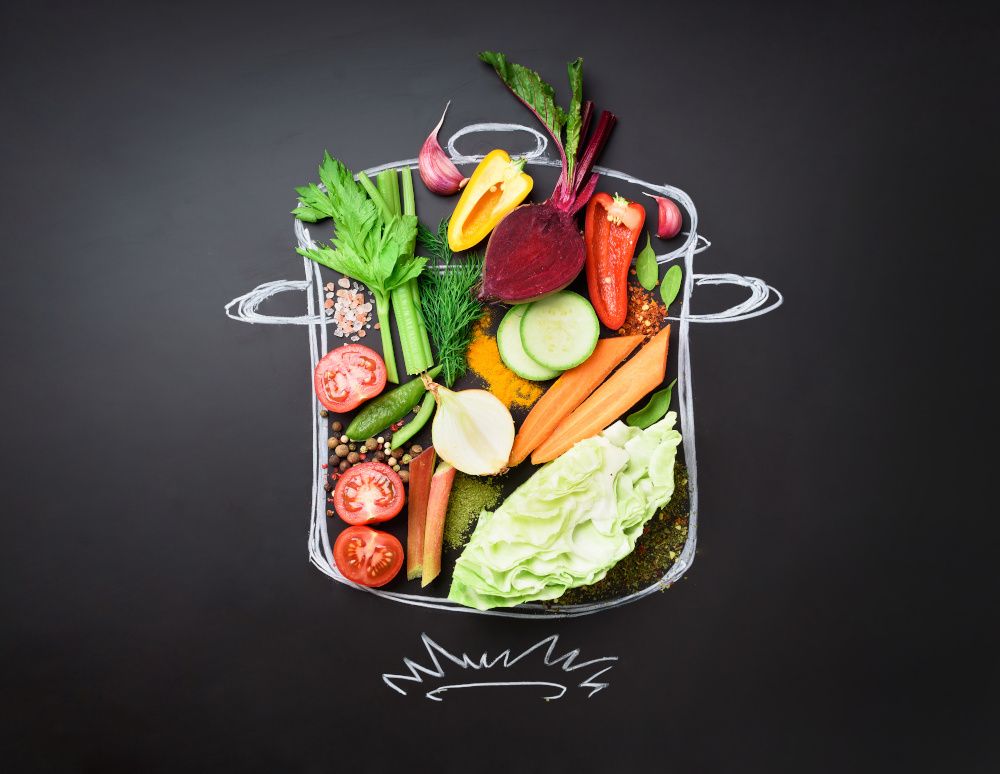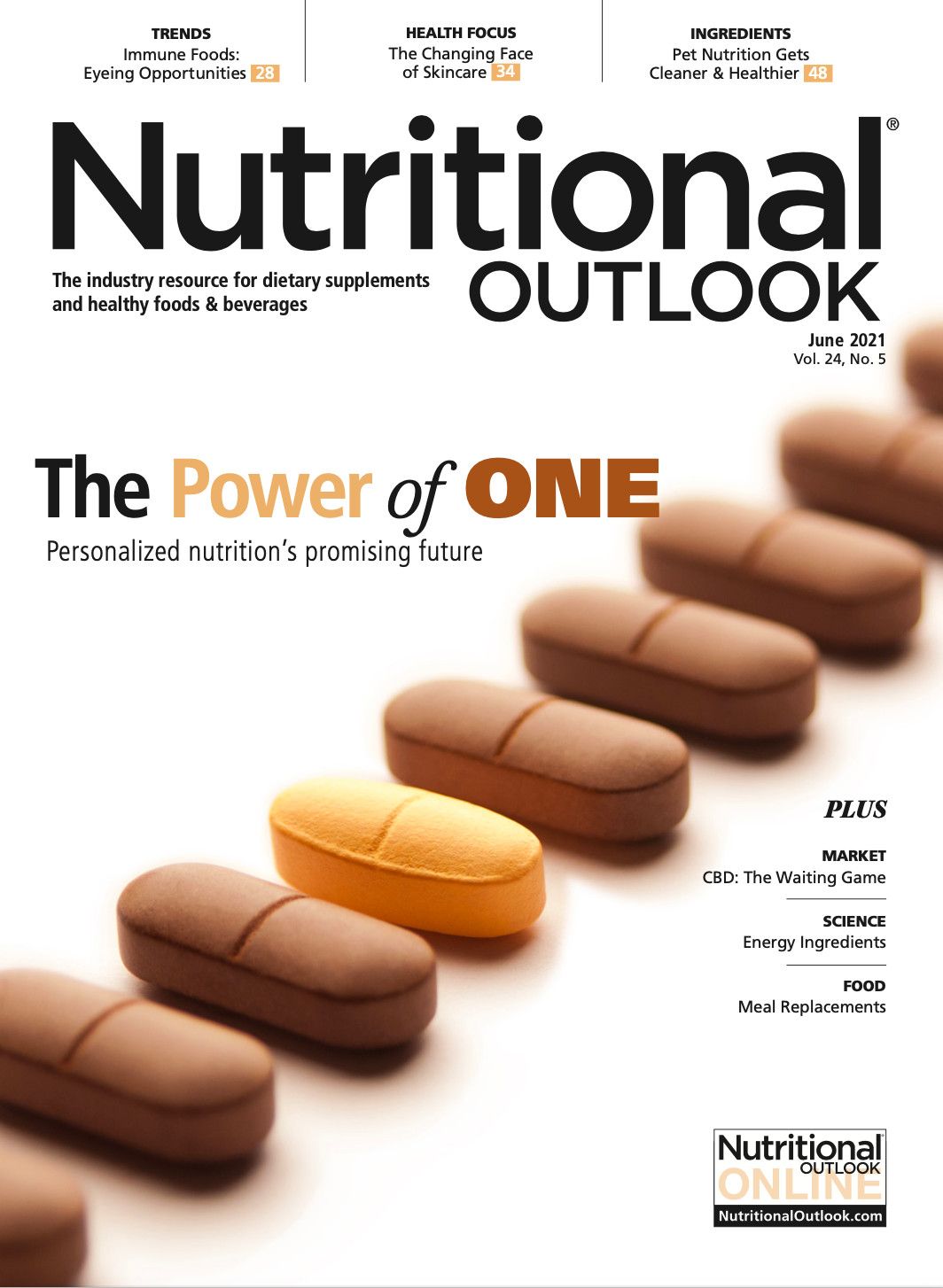Food and drink: What’s on the menu for immune support?
Are functional foods and beverages the latest frontlines for immune support?
Photo © Jchizhe - Stock.adobe.com

Immune support has been on the public radar a lot lately—for reasons that, at this point, are so obvious as not to need restating.
But what’s impossible to understate is the extent to which consumers, keen on toughening their inner defenses, have responded either by drafting immune-boosting supplements into the fight against emerging threats, or by seeking safe harbor in the antioxidant protection of whole fruits and vegetables.
…Or, in the case of a growing battalion, by earmarking a portion of their health-defense budgets for accumulating an arsenal of functional foods and beverages strategically formulated to strengthen immunity.
The entire health and wellness industry could gain from their efforts, wagers Cashtyn Lovan, marketing manager, Cargill Health Technologies (Ankeny, IA). As she points out, “It’s not so much that consumers are turning away from supplements,” she says, “as that they’re now expecting more from their food and beverage choices, too.”
And with brands recruiting promising immune-support ingredients into applications as appealing as they are effective, consumers are finding their expectations being met.
Feeling Good About Feeling Better
One of the more remarkable stories to emerge from the pandemic has been consumers’ awakening not just to immune health but to its relationship to diet and nutrition. And that awakening has rewarded the dietary supplement industry mightily.
“As we’ve witnessed over the past year,” says Lior Lewensztain, founder and CEO, That’s It. (Los Angeles), “immune-related supplements experienced a dramatic spike in demand as consumers looked for ways to proactively manage their health and immunity in the midst of a global pandemic.”
Pointing to SPINS data from late 2020, he says, “The U.S. supplements channel grew more than 40% over the previous year—a stunning increase, even in a space that was expecting consistent growth in the coming years.”
And this rising interest in immunity didn’t begin with the pandemic, either, Lovan points out—nor will it end with it. She cites data from HealthFocus International demonstrating that as far back as 2018, 4% of consumers claimed always to choose foods and beverages to boost their immune systems. “And by the fourth quarter of 2020,” she says, “that number had jumped to 13%.”
Another sign that immunity is here to stay: “The trend of consuming immune-health ingredients is shifting to a year-round strategy,” observes Maria Stanieich, marketing manager, Kyowa Hakko USA Inc. (New York, NY), “now that individuals are looking to support their immune systems proactively and consistently.”
Immunity on the Menu
Not only are consumers leaning into immunity these days; they’re learning about it, too—which is driving interest in attaining it via functional formulation.
As Lewensztain explains, “We’ve seen that consumers have had the time and interest over the past year to explore and research natural ways to improve and support their immune systems—and they’re looking beyond just supplementing with pills to shift more of their interest toward integrating food products with functional and immune benefits into their daily diets.”
Granted, Ali Webster, PhD, RD, director of research and nutrition communications, International Food Information Council (IFIC; Washington, DC), cautions that “while we know overall good nutrition is important to maintaining optimal immune health, there’s no clear evidence that any specific food or nutrient can provide a quick fix.”
Nevertheless, she continues, “It’s also clear that Americans have a sustained interest in the role that foods and certain nutrients can play in supporting immune health.” And that interest, in turn, is inspiring functional product development.
Immunity in a Bottle (or Can)
A lot of the action that’s happening is in the functional-beverage space, claims John Quilter, vice president of global portfolio, ProActive Health, Kerry (Beloit, WI). “Between 2016 and 2019—long before the events of 2020—launches of beverage products with an immunity claim grew 9% in the juice category, 43% in flavored bottled waters, and 32% in energy drinks,” he notes, citing data from Innova Market Insights.
None of which surprises Ilana Orlofsky, senior marketing manager, Imbibe (Niles, IL). As beverage-development specialists, her team has found that while immune-enhancing formulation has been a consistent project theme over the years, “We’ve seen a real surge of these requests in the past 12 months.”
The requests run the beverage gamut from juices, syrups, and powdered mixes to shots, sparkling water, and more. “They aren’t relegated to just one category or format,” Orlofsky says.
What’s more, Big Beverage is even getting in on the act. Case in point: Mountain Dew Rise incorporates vitamin C “to validate its immune-support claim,” she says, while PepsiCo’s LifeWTR immune-support SKU “leans on 10% of the RDV for zinc.”
Then there are the brands “that may not be household names,” she continues, but that are still moving the innovation needle, like Hellowater’s Defense line of fiber waters, Riff’s Sparkling Energy+ line with antioxidants, and Jordan’s Skinny Mixes’ Citrus Splash flavor, which delivers vitamins C and B12 and zinc.
So why are consumers drinking their way to immunity?
“A lower barrier to entry, or a lower commitment, is a big driver for functional beverages in general,” Orlofsky posits. “There’s validity to the premise that building a habit of taking a pill or gummy until you’ve gone through a bottle of 60 to 100—or more—requires much more devotion than drinking a 2.5-oz shot or 12-oz can once or twice.”
And when it comes to fueling interest in functional foods writ large, she adds, “We know that younger consumers are adventurous, and big proponents of snackification, which we believe holds appeal partly because it exposes them to more flavor profiles and sensory experiences—dimensions that resonate with Gen Z and Millennials.” And the experiential is what functional snacking and sipping is all about.
Usual Suspects
The actives working behind the scenes in those functional snacks and sips include both established immunity players and emerging nutrients just beginning to compile research records.
Speaking to the former, Orlofsky says, “the alphabet vitamins—A through E,” along with zinc, elderberry, echinacea, turmeric, and ginger all rank high among the immunity ingredients Imbibe is watching.
“We’re also seeing some fruits naturally rich in vitamin C pop up more,” she adds, “and we predict there will be more movement in these for the next several years.” Acerola cherry and camu camu both fall into that class.
Beta Version
“Another ingredient showing promise is beta-glucan,” she goes on, which she notes not only benefits immune health but is one of the actives present in trendy medicinal mushrooms, too.
Quilter points out that Kerry’s Wellmune, a natural yeast beta-glucan with immune benefits backed by more than a dozen published peer-reviewed clinical studies, has been a regular in immune supplements for years. But now it’s appearing in functional foods and beverages, as well.
“Last year, Charles & Alice, a leading manufacturer of healthy fruit and vegetable-based snacks, launched Fruit Friends Fortified Fruit Pouches with Wellmune for the U.S. market,” he points out. Also new in 2020, Simpl Innovative’s Phab protein powders and RTD shakes were India’s first protein beverages formulated with yeast beta-glucan for immune health, he claims.
“These are two very different products in different markets,” Quilter says, “but what they share is their ability to leverage the science behind Wellmune to demonstrate its real immune benefits—and when it comes to immune health, scientific substantiation is everything.”
Kim Edwards, global product manager, Kemin Human Nutrition and Health (Des Moines, IA), agrees, noting that in the Asia-Pacific region, algae has a long history of credibility in functional foods and beverages. What’s more, she says, Kemin’s BetaVia Complete, a beta-glucan sourced from a proprietary strain of Euglena gracilis algae, has shown up in everything from functional beverages, shots, and energy bars to eggrolls, fruit jellies, and soups.
“North America is just starting to take notice and formulate with this ingredient,” she says, “but we expect to see significant sales growth in various functional foods and beverages in the coming year.”
The beta-glucan’s benefits stem from its ability to prime the macrophages and dendritic cells that serve as “the body’s first line of natural defense,” Edwards explains, as well as from its promotion of healthy Lactobacillus and Bifidobacteria species and contribution to GI-tract integrity. What’s more, she underscores the algal ingredient’s “excellent fit” with plant-based product positioning.
Going Pro—and Pre, and Post
According to Kishan Vasani, cofounder and CEO of Spoonshot AI (St. Paul, MN), “We expect probiotics and prebiotics to gain greater traction in the coming year as a means to overall immunity.” And the reason is elementary. “Consumers are already quite familiar with these ingredients, and there’s growing research to highlight how important gut health is to overall health and wellness. As such, it won’t be difficult to convince consumers that probiotics and prebiotics can play an important role in their overall immunity.”
Lewensztain even goes so far as to call probiotics “the real standouts of the past year for their immune-boosting benefits.” In an effort to bring those benefits to out-and-about consumers, That’s It. formulated probiotics into their probiotic fruit bars. “One of the biggest breakthroughs of these bars is that they’ve made probiotics totally snackable,” Lewensztain says. “Not only are they packed with prebiotics and a serving of fruit; they’re also shelf stable and don’t require refrigeration.”
Shintaro Ichikawa, PhD, director, technical affairs, Kyowa Hakko USA Inc. (New York, NY), notes that his company’s Immuse ingredient isn’t a garden-variety probiotic, but, rather, a “novel paraprobiotic”—a patented strain of Lactococcus lactis that activates the immune system’s plasmacytoid dendritic cells (pDCs).
This “rare type of immune cell often described as the ‘commander-in-chief’ of the immune system,” Ichikawa explains, helps to organize the NK, killer T, helper T, and B cells that “take action for a more comprehensive approach to immune support.” That differentiates Immuse’s mechanism of action from that of conventional lactic-acid bacteria, which don’t act on pDCs, he adds.
And extending the probiotic narrative even further are postbiotics, bioactive compounds comprising microbial cells, cellular constituents, and metabolites that microbes produce during fermentation and that confer health benefits on their hosts.
It’s only been within the past few years that postbiotics have blipped onto radars, Lovan says, but Cargill’s EpiCor postbiotic—a yeast fermentate shown in more than a dozen published studies to promote immune health via gut-microbiota modulation—is already appearing in functional formulations.
Not being living organisms—as are probiotics—postbiotics are also more formulation-friendly, adds Justin Green, PhD, director of scientific affairs at Cargill Health Technologies. And with its heat and pH tolerance as well as a three-year shelf life from the date of manufacture, Cargill’s EpiCor offers “increased stability and consistency in formulations ranging from nutrition bars and beverage shots to teas, gummies, and chocolate coatings,” he says, “where the daily efficacious dose for adults of 500 mg is quite manageable.”
Cargill proprietary research even shows that roughly one-third of consumers already recognize postbiotics as contributing to a healthier gut and immune system, Lovan says. No wonder she’s bullish on them. “While they’re still very new to foods and beverages,” she says, “given their scientifically backed benefits, we think that demand for products containing postbiotics will continue to gain traction.”
As will demand for immune-boosting functional foods and beverages in general.





















Prinova acquires Aplinova to further increase its footprint in Latin America
April 7th 2025Prinova has recently announced the acquisition of Brazilian ingredients distributor Aplinova, which is a provider of specialty ingredients for a range of market segments that include food, beverage, supplements, and personal care.
Prinova acquires Aplinova to further increase its footprint in Latin America
April 7th 2025Prinova has recently announced the acquisition of Brazilian ingredients distributor Aplinova, which is a provider of specialty ingredients for a range of market segments that include food, beverage, supplements, and personal care.
2 Commerce Drive
Cranbury, NJ 08512
All rights reserved.

